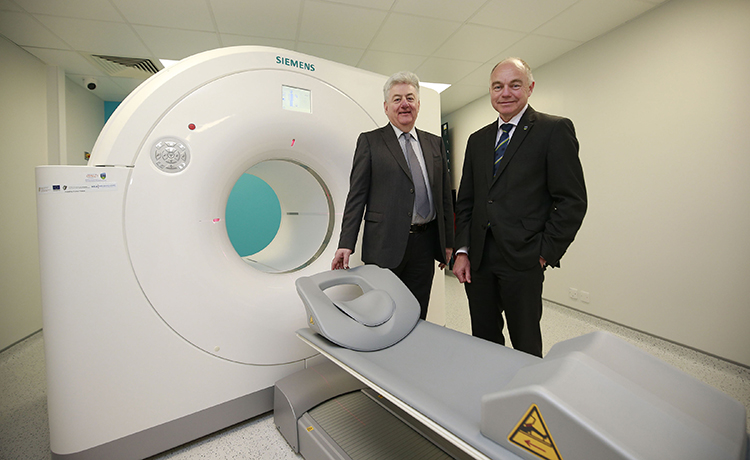New PET CT Research Imaging Centre will improve patient treatment and advance research in major diseases

James Menton, Chair of St. Vincent’s Healthcare Group with Professor Andrew Deeks, UCD President UCD, with the new PET CT Scanner
As new antiretroviral medicines for HIV have emerged, patients are living longer with the condition, but these drugs can cause cardiovascular side -affects.
Prof Mallon will use the scanner to identify early changes in inflammation in the major blood vessels, which may be a predictor of heart disease/damage.
• (opens in a new window)Professor Jonathan Dodd, Clinical Full Professor at the UCD School of Medicine and Consultant Radiologist, St. Vincent’s University Hospital is undertaking a study to help identify psoriatic arthritis earlier so that its progression can be slowed down or prevented.
He will use the PET CT to detect vascular inflammation and joint inflammation in patients with psoriatic disease who are asymptomatic or have no signs of arthritis on clinical examination.
Using this approach, patients with subclinical psoriatic arthritis will be identified earlier and their treatment can be initiated to improve their overall health outcomes.
• (opens in a new window)Professor Douglas Veale, Adjunct Full Professor at the UCD School of Medicine and Consultant Rheumatologist, St. Vincent’s University Hospital is investigating the effectiveness of biologic treatment for patients with Achilles Tendon enthesitis (inflammation of the bone where ligaments/tendons attach).
Biologic treatment uses genetically engineered proteins made from human genes that zero in on specific targets that control the inflammation process.
Benefitting from the better imaging of tissue and bone provided by the new scanner, Prof Veale will assess the overall disease activity, patient function and quality of life over a four-month period to measure the effectiveness of the treatment.
By: Staff Writers, UCD University Relations
UCD academics on The Conversation
- Opinion: The leap year is February 29, not December 32 due to a Roman calendar quirk – and fastidious medieval monks
- Opinion: Nigeria’s ban on alcohol sold in small sachets will help tackle underage drinking
- Opinion: Nostalgia in politics - Pan-European study sheds light on how (and why) parties appeal to the past in their election campaigns






